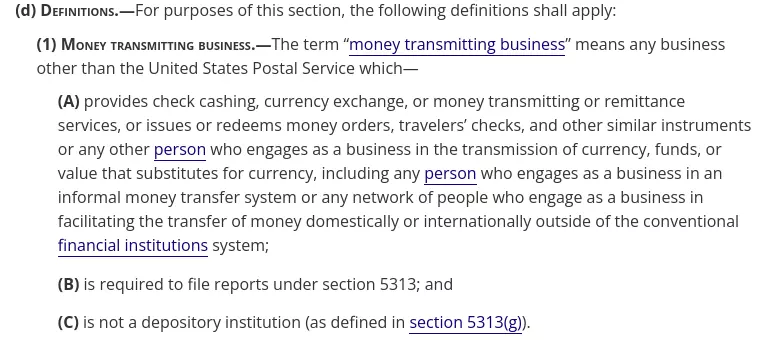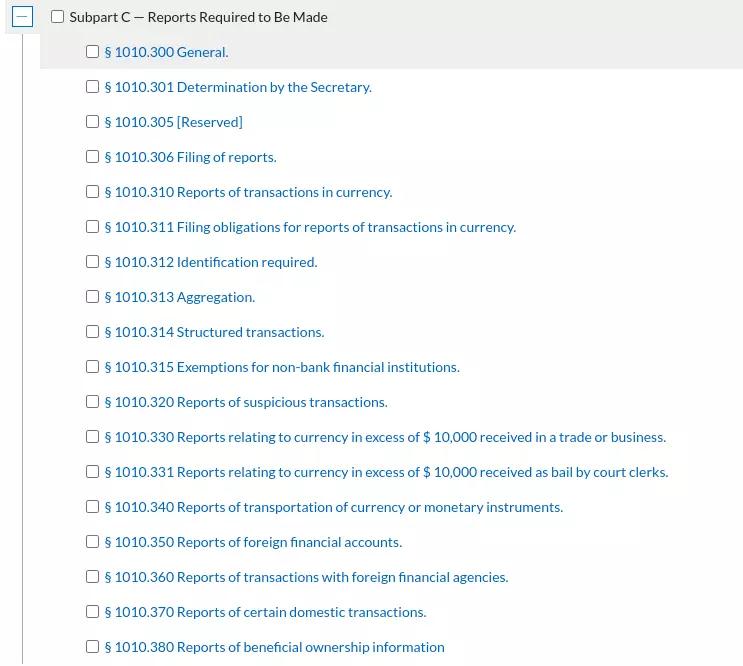Mallard Beakman on Nostr: Here's an example of painful legal analysis I like to do on my free time for some ...
Here's an example of painful legal analysis I like to do on my free time for some reason (I wanted to see if Samourai could actually be a "money transmitting business" as alleged). According to 31 U.S.C. § 5330(d)(1)(A)-(B) (left), the definition can apply to a "business" that both (1) "engages as a business in the transmission of ... value that substitutes for currency" and that (2) must file a report under 31 U.S.C. § 5313.
But 31 U.S.C. § 5313 (right) simply says that the Treasury gets to say which "financial institution" files a report. The Treasury, I found in 31 C.F.R. § 1010.300, says that "all financial institutions," as they are defined in 31 U.S.C. 5312(a)(2), must comply with the reporting requirements of subpart C (shown below). Section 5312(a)(2), in turn, shows that a "financial institution" includes "any [] person who engages as a business in the transmission of currency, funds, or value that substitutes for currency, including any person who engages as a business in an informal money transfer system or any network of people who engage as a business in facilitating the transfer of money domestically or internationally outside of the conventional financial institutions system." See 31 U.S.C. 5312(a)(2)(R). (So 31 U.S.C. § 5330(d)(1)(A) and (B) circuitously seem to refer to the same damn thing). So this absurdly broad definition would seemingly cover Samourai (as well as all Lightning service providers and miners). Whether or not a "money transmission business" can encompass node operators or wallet providers seemingly depends on the interpretation of the term "engages as a business."
If the statutory basis for the allegation cannot be attacked, I understand it must be attacked on constitutional grounds. At the very least this challenge will likely involve the First Amendment, which is its own complicated area of the law.
And at this point my head hurts. I'm going to switch to reading some sci-fi for now.



But 31 U.S.C. § 5313 (right) simply says that the Treasury gets to say which "financial institution" files a report. The Treasury, I found in 31 C.F.R. § 1010.300, says that "all financial institutions," as they are defined in 31 U.S.C. 5312(a)(2), must comply with the reporting requirements of subpart C (shown below). Section 5312(a)(2), in turn, shows that a "financial institution" includes "any [] person who engages as a business in the transmission of currency, funds, or value that substitutes for currency, including any person who engages as a business in an informal money transfer system or any network of people who engage as a business in facilitating the transfer of money domestically or internationally outside of the conventional financial institutions system." See 31 U.S.C. 5312(a)(2)(R). (So 31 U.S.C. § 5330(d)(1)(A) and (B) circuitously seem to refer to the same damn thing). So this absurdly broad definition would seemingly cover Samourai (as well as all Lightning service providers and miners). Whether or not a "money transmission business" can encompass node operators or wallet providers seemingly depends on the interpretation of the term "engages as a business."
If the statutory basis for the allegation cannot be attacked, I understand it must be attacked on constitutional grounds. At the very least this challenge will likely involve the First Amendment, which is its own complicated area of the law.
And at this point my head hurts. I'm going to switch to reading some sci-fi for now.



